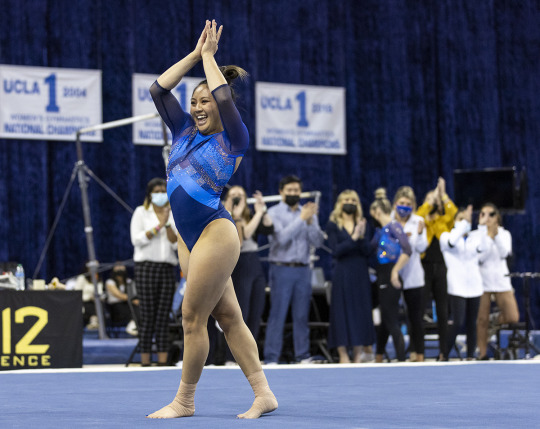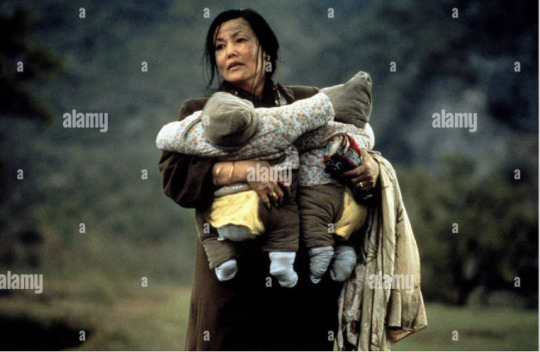Here are my thoughts and analysis on my favorite book and film, The Joy Luck Club by Amy Tan. Hope you enjoy ;)
Don't wanna be here? Send us removal request.
Text
The Joyluck Club Week 5 Analysis:
The chapter “Double Face” takes place on Waverly Jong’s wedding day. On this day Waverly and her mother Lindo have a mutually subconscious understanding that it is a huge day for both Waverly and Lindo. Due to these emotions of happiness, fear, and self-identity, Waverly and her mother recollect and reflect on her upbringing and Waverly’s life leading up to this big day. There is this distance and disconnect between Waverly and Lindo because of their different environment and experiences in their girlhood that shaped who they are in this moment. Waverly reveals a fear that she is too Chinese that she cannot return to America while in contrast, Lindo says that Chinese citizens could tell she is American in one look. Lindo had always tried to raise her daughter half-Chinese and hald-American which she now looks back and regrets as there is no such thing. She feels that because she did not teach Waverly enough about her Chinese heritage, they experience a lack of similarity internally. Lindo recalls her memories of her mother and how she was raised with a “Chinese face” but allowed her daughter to develop an “American face” which had created a broken bridge between them. This story feels like parallel lines in comparison to what I have observed about my sister and my mother’s relationship. My mother and I always had a special bond that no one else in our family had. We always shared similar experiences and thought processes, it was like whenever I would tell my mom what I was struggling with at the moment, she had that exact same feeling before. On the other hand, since her teenage year, my sister has never been fond of my mom and always had reservations against her. They would lack understanding between each other as my sister struggled to see the good qualities of my mom and my mom would not be able to please my sister. Part of this could have been because of the distance my mother had with our family for a couple years as she was always traveling for work. But, the two of them now have different political views, spiritual values, and overall personalities and struggle to find common ground. I have always felt like the bridge of our family because I share relatability with everyone and get along with everyone in different ways. #TheJoyluckClub #WaverlyJong #Lindo

4 notes
·
View notes
Text
The Joyluck Week 4 Analyis:
In the chapter “Without Wood” Rose Hsu Jordan has an epiphany and finds a new strength within her to stand up for herself and not give in to others, or in her mother’s words having “wood”. In the midst of a pending divorce requested by her husband, he tells Rose to move out of the house because he wants another woman to move in with him. Being met with aggression, Rose would usually back away and abide by the other person’s requests without giving herself a say. Her mother however has suspected her husband’s affair for some time and tells Rose that she lacks “wood” which means strength towards other’s aggressions when they are taking advantage of you or taking you for granted. So, Rose stands her ground and refuses to sign the divorce papers which manifests that she is no longer allowing herself to be manipulated and taken advantage of. The way Ted nonchalantly mentioned of another woman moving in shows the power imbalance and the superiority he feels in the relationship. With this hardship, Rose is able to reflect on her marriage and realize the damages she has endured from Ted and how she had been gaslighted into blame in every corner of their marriage. The thematic core of this chapter parallels to my life in many ways and how I have grown from allowing people to take advantage of me. Something I have always struggled with is sticking up for myself or speaking up when something is wrong or if I needed help; I was scared of causing trouble, being problematic, and having people view me differently. I would always have to psychoanalyze the situation and the possible outcomes of standing up for myself and opposing others actions towards me or something I believed in; however, I have been able to grow and realize that when I believe something is right, I should stand by it. When my gymnastics coach had me perform a routine that was too difficult for me to successful execute during a competition setting, I told him that I needed to downgrade some skills or I would not be able to score to the best of my ability. This was tough because I held immense respect for my coach and wanted to please everyone at all times, but I was able to reassure myself that it was the wisest decision I could make in that situation, so I spoke up. #TheJoyluckClub #LiteratureAnalysis #Gymnastics #RoseHsu


1 note
·
View note
Text
The Joyluck Club Week 3 Analysis:
Superstitions are a common phrase we hear everyday, we may have learned this from our parents or maybe it was brought down from our culture. Lena St. Clair narrates this chapter, “Rice Husband” where she takes a trip down memory lane of all the tragedies her mother magically predicted. She recalls something that would haunt the rest of her childhood. When her mother said that for every rice grain she does not finish, her future husband will have a pock mark on his face. Flash forward to Lena’s current marriage with Arnold where they would go on and build a successful business of a restaurant. Although, they both put in valiant efforts to build up the business from ground. In the end, her husband Arnold takes all the recognition, pride, and profits leaving Lena with only 1/7 of his income; he also refuses to promote her any further. Though frustrated, there is nothing Lena is able to do to revolt, because in Chinese culture, women have always been told to submit to their husbands. Ultimately, childhood teachings, social systems, morals, and folklore’s from generations past build the character and the fate of the future generations whether positive or negative. To connect this to today’s society in pop culture, there are many occasions that female public figures are held to higher standards and questioned for their success compared to their male counterparts. Women are often scrutinized viciously by the media when they do something that fails to fit in the public’s normality; however, when men do the same thing people seemingly let it slide and view it as normal or cool. For example, the singer-songwriter Taylor Swift is the best-selling artist of the century with over 140 million albums sold worldwide but she is often reduced to writing songs about her exes or being a serial dater. In Swift’s song “The Man” she sings: “If I was a man, then I’d be the man”. This leaves the question that if Swift was of the opposite gender, would society be more comfortable with giving her the credit on the impact she has made on the music industry? Would Lena have gotten the credit she contributed on the restaurant if the genders of Lena and her husband were switched? From folk tales brought down from generation to generation, cultural roots created before our memory, such as traditions and human morality; and the history that we learn today from translated texts. All of these things shape our modern society today and the societal roles that are “labeled” to us at birth. #TheJoyLuckClub #LiteratureAnalysis #SocialContruct

0 notes
Text
The Joyluck Club Week 2 Analysis
The chapter “Rules of the Game” follows the childhood of Waverly Jong, the daughter of Linda Jong. In this story, a new theme of fame is shown and all the atrocities that come with it becomes evident. As a child Waverly was taught by her mother “the art of invisible strength” which would later help her become a child prodigy at chess. During Christmas, one of her brothers received a chess board that was missing pieces. To make up for this, Waverly used two pieces of candy to fill in for the missing pieces to play against her brother. Through the game of chess, she discovered strategy, awareness of the opponents tactics, and foreseeing different directions the game could go. She fell in love with the game and became more clever and witty learning new techniques she learned from an old man Lao Po. Soon she broke records become the youngest chess national champion at only nine years old. Following her success, she gained a lot of attention in the San Francisco Chinatown community. Everywhere she went she was like a celebrity receiving many compliments and praise from locals. But her mother took advantage of this and used her daughter’s success for her pride and bragged about her everywhere she went. One day she broke down and yelled at her mother in public and then ran away. When she made her way back her mother had said that she no longer cares for her as she does not care about her family. This shows that her mother was using her for her fame and did not care about her feelings. At first receiving attention and popularity makes a person happy, but all the negative effects coming out of it takes away from someone’s normal life. To connect this with pop culture, I thought of the song “The Lucky One” by Taylor Swift. The lyric: “And they tell you that you’re lucky, but you’re so confused. ‘Cause you don’t feel pretty, you just feel used.” This lyric directly parallels what Waverly Jong went through as a child prodigy being used by her mother for pride. #Joyluckclub #WaverlyJong #TheLuckyOne


0 notes
Text
Pages (1-71) Analysis
The first seventy pages of “The Joy Luck Club” paints readers a delicately vivid image of a group of families in China during World War II when the Japanese raided Chinese villages. The author is able to depict this through different perspectives from the daughter’s of the original members of the Joy Luck Club as they uncover their family history. The story takes place after the death of Suyuan Woo, the founder of the Joy Luck Club where her daughter attends one of the gatherings and tries to fit in her mother’s former role. During this, there are many flashbacks which reveal that the club was started on a hill that many Chinese families hid in during the war; however, instead of families grieving everything they had lost, they all enjoy a feast of whatever food they could gather and celebrate what they still have. To compare this with other literature books about war, the character Shlomo Wiesel in Night by Elie Wiesel has a contrasting personality and perspective of life compared to Suyuan Woo. Suyuan Woo is determined to cherish what she still has and find happiness in awful conditions: “It’s not that we had no heart or eyes for pain. We were all afraid. We all had our miseries. But to despair was to wish back for something already lost. Or to prolong what was already unbearable. How much can you wish for favorite warm coat that hands in the closet of a house that burned down with your mother and father inside of it?” (Tan 11). This way of thinking is one of the factors that strengthens Suyuan’s will to maintain hope and happiness through cataclysmic events. On the other hand in Night, the father of Elie Wiesel constantly holds him back and becomes a liability that Elie is unable to keep fighting for. He allows the war to crumble him and his son’s joy in living. Although, Shlomo was a very caring and compassionate father, he lacked the fearlessness and leadership that Suyuan held which allowed her to maintain motivation to live. #fearless #suyuanwoo #joyluckclub

1 note
·
View note